
The orthopteran family Rhaphidophoridae of the suborder Ensifera has a worldwide distribution. Common names for these insects include jumping wētā, cave wētā, cave crickets, camelback crickets, camel crickets, Hogan bugs, spider crickets, land shrimp, and sand treaders. Those occurring in New Zealand and Australia are typically referred to as jumping or cave wētā. Most are found in forest environments or within caves, animal burrows, cellars, under stones, or in wood or similar environments. All species are flightless and nocturnal, usually with long antennae and legs. More than 500 species of Rhaphidophoridae are described.
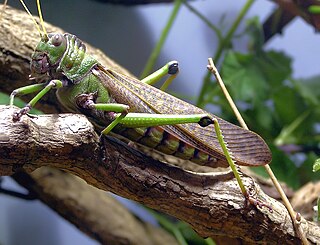
The Romaleidae or lubber grasshoppers are a family of grasshoppers, based on the type genus Romalea. The species in this family can be found in the Americas.
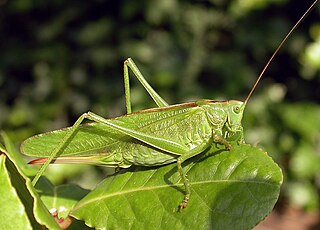
The Tettigoniinae are a subfamily of bush crickets or katydids, which contains hundreds of species in about twelve tribes.

Trigonidiinae is a subfamily of insects in the order Orthoptera, suborder Ensifera, based on the type genus Trigonidium. They are often referred to as sword-tail crickets, winged bush crickets or trigs.
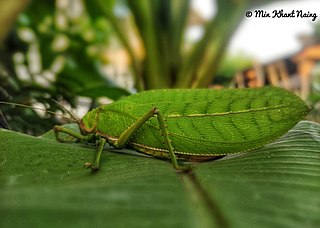
The subfamily Pseudophyllinae contains numerous species in the family Tettigoniidae, the katydids or bush crickets. Sometimes called "true katydids", together with the crickets of suborder Ensifera, they form part of the insect order Orthoptera which also contains grasshoppers.

The Phaneropterinae, the sickle-bearing bush crickets or leaf katydids, are a subfamily of insects within the family Tettigoniidae. Nearly 2,060 species in 85 genera throughout the world are known. They are also known as false katydids or round-headed katydids.

Scudderia is a genus of katydids in the subfamily Phaneropterinae. They are sometimes called bush katydids and are 30-38 mm in length. Their range is most of North America, northernmost being in Southern Canada. They are herbivores, with nymphs feeding primarily on flowers and adults preferring woody deciduous plants.

Holochlora is a genus of bush-crickets in the subfamily Phaneropterinae. They occur in Africa and Asia.

Mecopodinae are a subfamily of bush crickets found in western South America, sub-Saharan Africa, and Asia. In Asia, the distribution includes India, Indochina, Japan, the Philippines, and Malesia to Papua New Guinea and Australasia, including many Pacific islands.

Copiphora is a genus of bush crickets or katydids in the subfamily Copiphorinae (coneheads) from southern Mexico, Central America and South America, with a single doubtful species, C. subulata, from Africa.
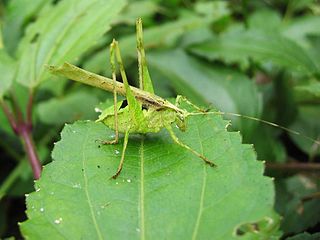
Insara, commonly known as western bush katydids, is a genus of katydids in the family Tettigoniidae.

Romaleinae is a subfamily of lubber grasshoppers in the family Romaleidae, found in North and South America. More than 60 genera and 260 described species are placed in the Romaleinae.
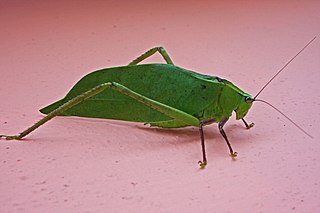
Stilpnochlora is a genus of phaneropterine katydids in the family Tettigoniidae, native to tropical and subtropical parts of the Americas. There are about 15 described species in Stilpnochlora.
Turpilia is a genus of phaneropterine katydids in the family Tettigoniidae. There are about nine described species in Turpilia.
Montezumina is a genus of phaneropterine katydids in the family Tettigoniidae. There are at least 30 described species in Montezumina.
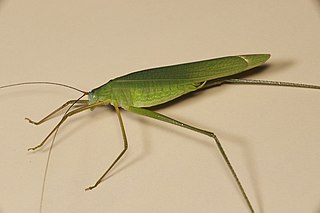
Elimaea is a large genus within Tettigoniidae, the bush cricket or katydid family. Species in this genus are found in India, southern China, Indo-China and Malesia.
Anabropsis is a genus of king crickets in the tribe Anabropsini. They are found tropical areas of the Americas, Africa and Asia.

Orophus is a small genus of katydids native to Mexico, Central America, and South America.

Moncheca is a genus of relatively large, colorful conehead katydids in the tribe Copiphorini, native to the Neotropics.

















